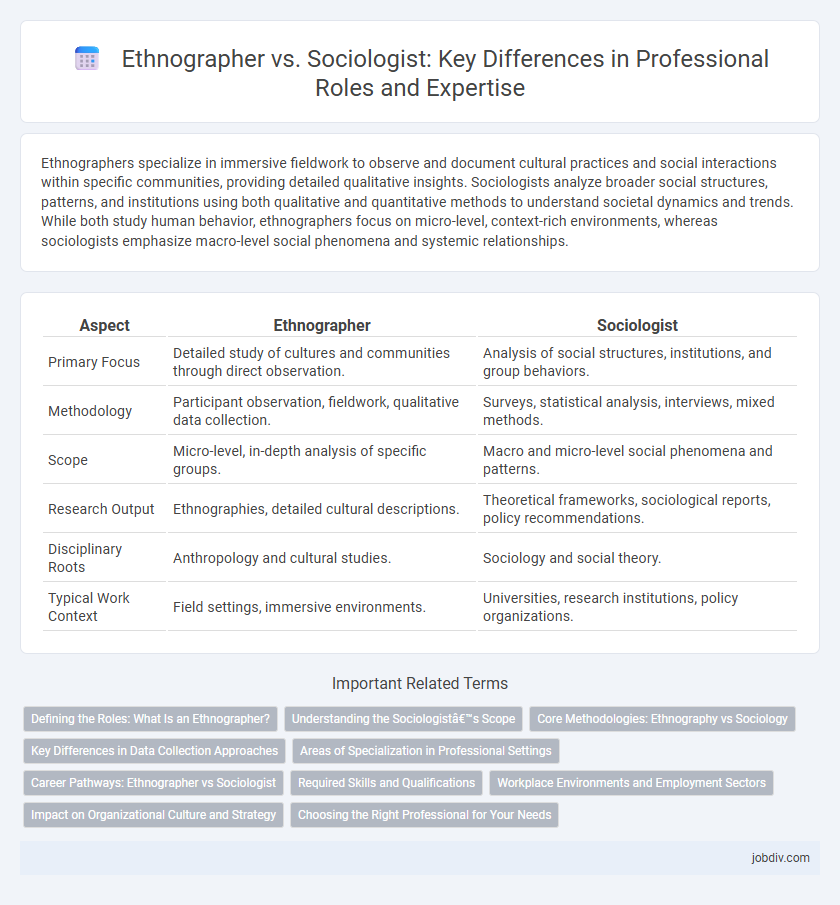Ethnographers specialize in immersive fieldwork to observe and document cultural practices and social interactions within specific communities, providing detailed qualitative insights. Sociologists analyze broader social structures, patterns, and institutions using both qualitative and quantitative methods to understand societal dynamics and trends. While both study human behavior, ethnographers focus on micro-level, context-rich environments, whereas sociologists emphasize macro-level social phenomena and systemic relationships.
Table of Comparison
| Aspect | Ethnographer | Sociologist |
|---|---|---|
| Primary Focus | Detailed study of cultures and communities through direct observation. | Analysis of social structures, institutions, and group behaviors. |
| Methodology | Participant observation, fieldwork, qualitative data collection. | Surveys, statistical analysis, interviews, mixed methods. |
| Scope | Micro-level, in-depth analysis of specific groups. | Macro and micro-level social phenomena and patterns. |
| Research Output | Ethnographies, detailed cultural descriptions. | Theoretical frameworks, sociological reports, policy recommendations. |
| Disciplinary Roots | Anthropology and cultural studies. | Sociology and social theory. |
| Typical Work Context | Field settings, immersive environments. | Universities, research institutions, policy organizations. |
Defining the Roles: What Is an Ethnographer?
An ethnographer systematically studies cultures and social interactions through immersive fieldwork, emphasizing participant observation and qualitative data collection. Their role involves detailed documentation of everyday practices to reveal cultural norms, behaviors, and meanings within specific communities. Unlike sociologists, who often analyze social structures and patterns using diverse methods, ethnographers prioritize in-depth, contextualized understanding through direct engagement.
Understanding the Sociologist’s Scope
Sociologists analyze social structures, patterns, and institutions to understand group behaviors and societal changes, using quantitative and qualitative methods across broad populations. Their scope extends to examining issues like inequality, social policy, and cultural norms, often employing surveys, statistical analysis, and theoretical models. This contrasts with ethnographers who primarily focus on in-depth, immersive fieldwork to capture the lived experiences and meanings within smaller, specific communities.
Core Methodologies: Ethnography vs Sociology
Ethnographers employ immersive participant observation and qualitative fieldwork to capture detailed cultural practices and lived experiences within specific communities. Sociologists utilize a broader range of methodologies, including surveys, statistical analysis, and comparative studies, to analyze social patterns, institutions, and structures at macro and micro levels. Both disciplines prioritize understanding social behavior but differ in the depth of contextual focus and methodological scope.
Key Differences in Data Collection Approaches
Ethnographers primarily use participant observation and immersive fieldwork to collect qualitative data, capturing detailed cultural and social interactions within specific communities. Sociologists rely more on a mix of quantitative methods such as surveys and statistical analysis alongside qualitative interviews to analyze broader social patterns and structures. The core distinction lies in ethnographers' emphasis on deeply contextualized, firsthand experience versus sociologists' focus on generalizable data through diverse methodological combinations.
Areas of Specialization in Professional Settings
Ethnographers specialize in immersive fieldwork, focusing on detailed cultural and social practices within specific communities, often in anthropology or market research. Sociologists analyze broader social structures, patterns, and institutions, emphasizing trends in education, crime, or family dynamics within societies. Both professionals apply qualitative and quantitative methods, but ethnographers prioritize participant observation while sociologists often employ statistical analysis and theoretical frameworks.
Career Pathways: Ethnographer vs Sociologist
Ethnographers typically pursue careers centered on immersive fieldwork, often within anthropology or cultural research organizations, emphasizing qualitative methods to study societies in natural settings. Sociologists commonly engage in broader social research across academic institutions, government agencies, and private sectors, utilizing both quantitative and qualitative data to analyze social behaviors, institutions, and trends. Career pathways for ethnographers often involve roles in ethnographic consulting, user experience research, and cultural resource management, while sociologists find opportunities in policy analysis, social research, and community development.
Required Skills and Qualifications
Ethnographers require strong qualitative research skills, including participant observation and in-depth interviewing, alongside cultural sensitivity and fieldwork adaptability. Sociologists need advanced analytical abilities in quantitative and qualitative methods, with proficiency in statistical software and theoretical frameworks. Both professions demand a solid academic background, typically a master's or doctoral degree in anthropology or sociology.
Workplace Environments and Employment Sectors
Ethnographers specialize in immersive fieldwork within workplace environments, capturing detailed social interactions and cultural practices that shape employee behavior across sectors such as healthcare, education, and technology. Sociologists analyze broader employment trends, organizational structures, and labor market dynamics, often utilizing quantitative data from industries like manufacturing, finance, and public services. Both professions contribute complementary insights for understanding workplace culture and employment conditions, with ethnographers emphasizing micro-level, qualitative observations and sociologists focusing on macro-level, statistical analysis.
Impact on Organizational Culture and Strategy
Ethnographers provide deep qualitative insights into organizational culture by immersing themselves in the daily experiences and behaviors of employees, uncovering unspoken norms and values that shape workplace dynamics. Sociologists analyze broader social structures and institutional frameworks, offering strategic perspectives on how organizational culture aligns with external societal trends and influences long-term strategy. Integrating ethnographic depth with sociological breadth enables organizations to develop culturally informed strategies that enhance employee engagement and competitive advantage.
Choosing the Right Professional for Your Needs
Ethnographers excel in immersive, qualitative research by observing and participating in cultures to uncover deep social insights, making them ideal for projects requiring detailed cultural understanding. Sociologists offer broader analytical frameworks through quantitative and qualitative methods to study social behaviors, structures, and institutions, suitable for addressing societal trends and policy implications. Selecting the right professional depends on whether your need centers on in-depth cultural context and participant observation or comprehensive analysis of social patterns and statistical data.
Ethnographer vs Sociologist Infographic

 jobdiv.com
jobdiv.com